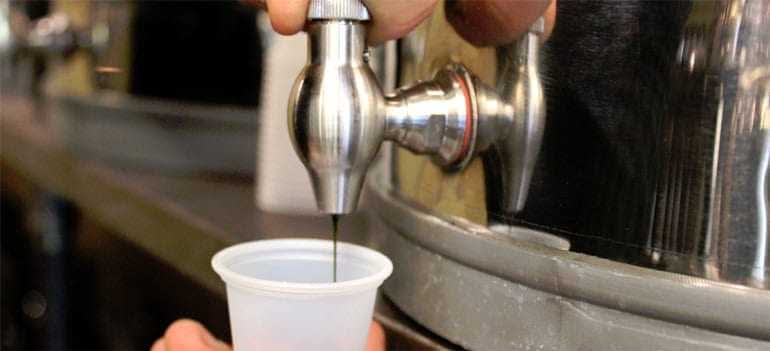
The agency responsible for enforcing a new ban on the sale of “on-tap” olive oil in the United Kingdom has provided new details on what would constitute such a sale.
The ban was announced on August 20, when the Rural Payments Agency updated its “Olive oil regulations and inspections” after Article 2 of Commission Regulation 29/2012, as interpreted by a 2006 decision by the European Court of Justice, disallowed the sale of all un flavored olive oils on tap, the agency said.
Few details were provided for the new rule, which could impact hundreds of small businesses who operate “fill-your-own” shops where olive oils are dispensed from stainless tanks called “fusti.” Catering to consumers’ growing interest in quality olive oil, the shops, where customers are invited to taste before buying, are part of an international retail trend.
Critics of the concept say the shops are often ill-equipped to handle, store and dispense olive oil, and that they bypass Europe’s stricter labeling laws.
Seeking clarification of the new rule, Olive Oil Times posed questions to the Rural Payments Agency (RPA) on August 24. Today, a representative responded, conceding the questions “raised complex legal issues which have needed to be fully explored,” about the prohibition it posted on its website that gave merchants until this December 13 to stop so-called “on-tap” sales.
Question: When exactly does the violation occur in an on-tap shop?

RPA: A breach would occur when, for example, relevant olive oil is presented/offered for sale in a drum which has no intact seal, and that oil is drained from the drum and bought by a consumer. It makes no difference if the container (bottle) into which that oil was drained was sealed before the sale, and that seal remained intact at the moment of sale.
Question: What was the basis for this rule? Was there a debate on banning these types of stores?
RPA: An ‘on-tap’ method of marketing relevant olive oil is not allowed under the provisions of Article 2 of Commission Implementing Regulation 29/2012, as those provisions have been definitively interpreted by the Court of Justice of the European Union in Case No C‑489/04 (Alexander Jehle, Weinhaus Kiderlen – v – Land Baden-Wurttemberg).
Question: What if a store filled bottles in the back room and labelled each one to comply with the regulations?
RPA: This would not be prohibited by Commission Implementing Regulation (EU) No. 29/2012 on marketing standards for olive oil, provided the oil was bottled and sealed before the oil was presented/offered for sale to final consumers, and the seal remained intact at the moment of sale. Anyone holding olive oil, from extraction up to, and including, the bottling stage must keep entry and withdrawal registers for each category of oil they hold, in accordance with the details on gov.uk.
Question: What if consumers were simply able to taste oils from bulk containers that displayed all the necessary information about the oils inside — to decide whether to buy a sealed, fully-labeled bottle of it?
RPA: Such tasting would not be prohibited by Commission Implementing Regulation 29/2012. However, it should be noted that Article 2(3) of Directive 2000/13 prohibits presentation or advertising of foodstuffs which could mislead a purchaser to a material degree particularly as to the characteristics of the foodstuff or by attributing to the foodstuff properties which it does not possess. Therefore, if the olive oil for tasting misled a prospective purchaser in a material way about the olive oil they eventually bought, this would be a breach of the relevant provisions of the Directive and the Regulation, to be enforced by the relevant local authority.
The rule, which will take effect December 13, 2014, applies to extra virgin, virgin, and refined olive oils, and olive pomace oil. Flavored olive oils, such as those infused with garlic, are not affected.
Under the new regulation, virgin olive oil labels must designate a country of origin; refined oils don’t have to. Anyone bottling olive oil will need to keep detailed records that would be subject to inspections by the RPA at any time.








